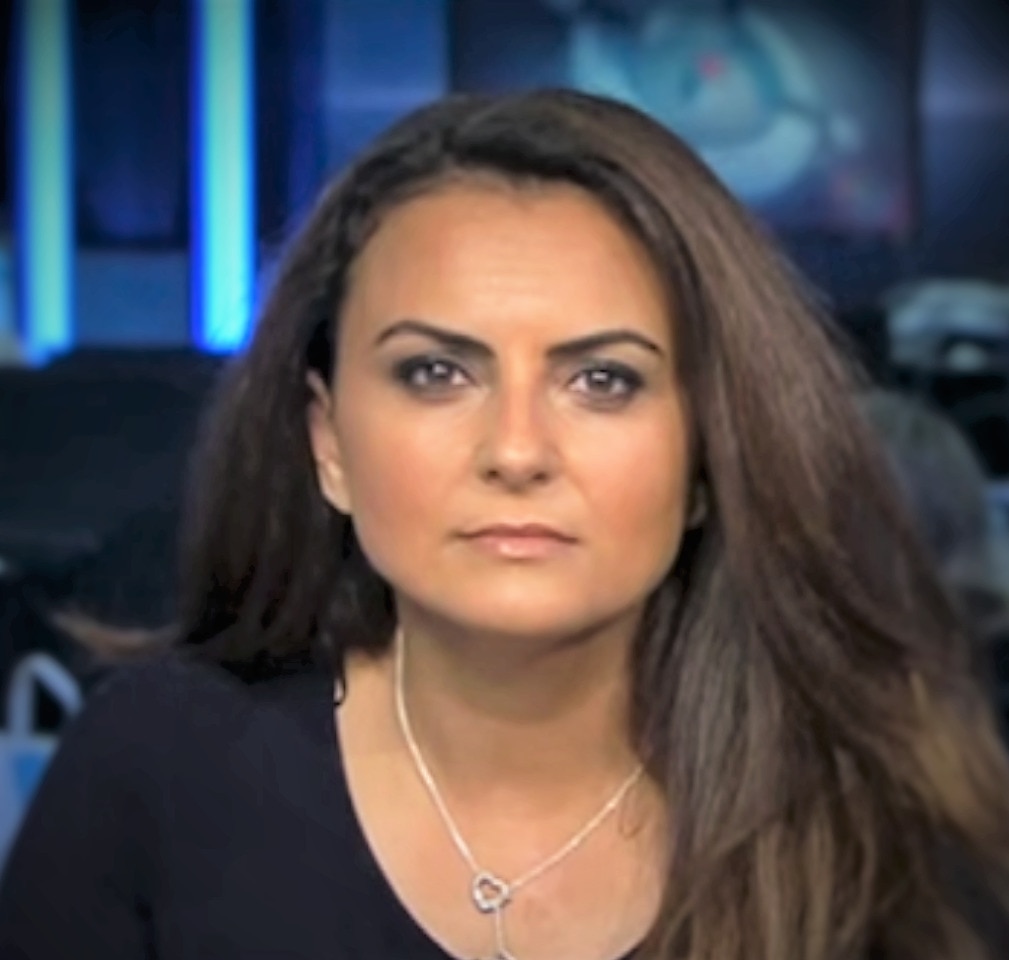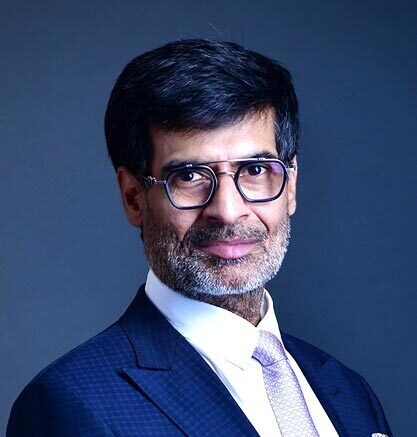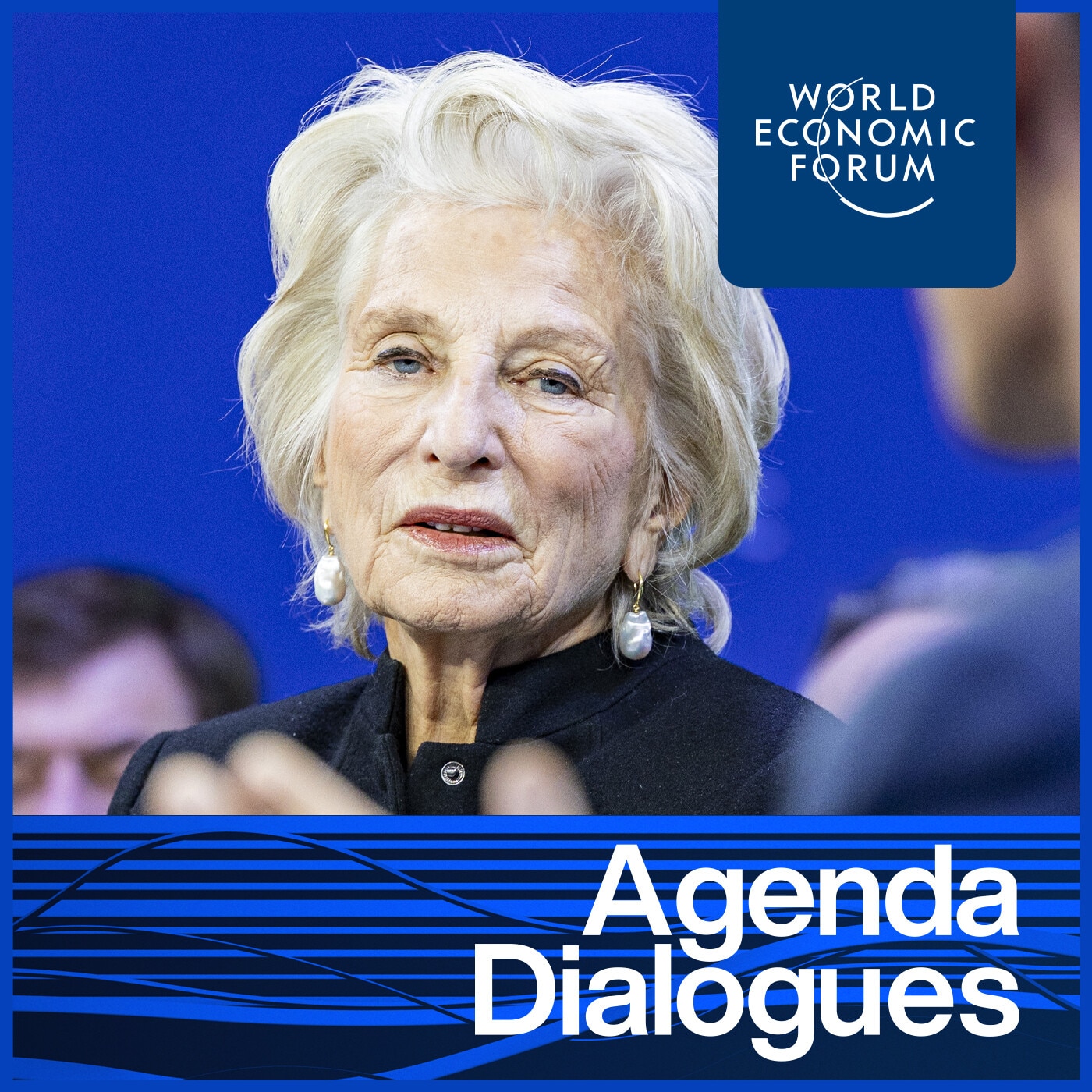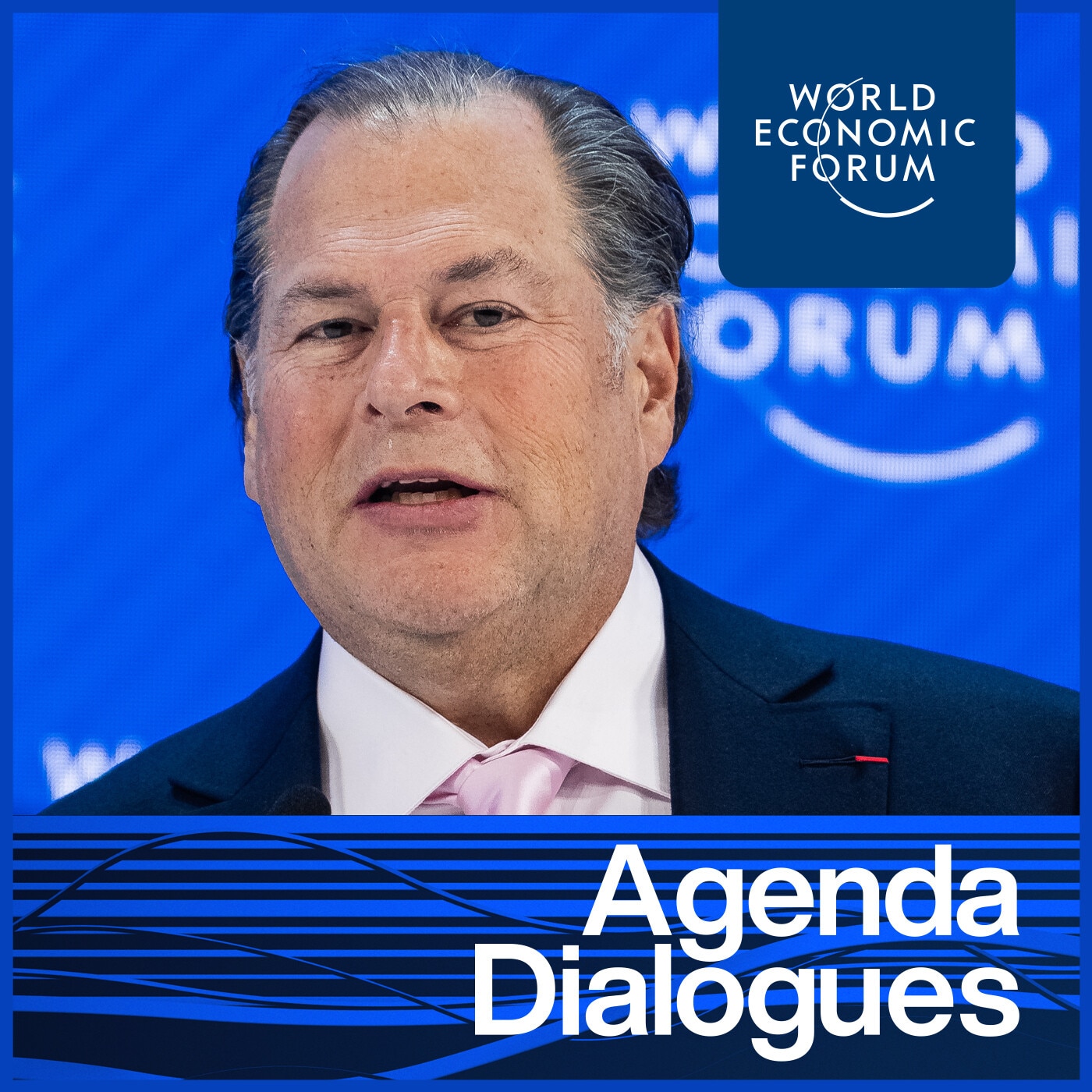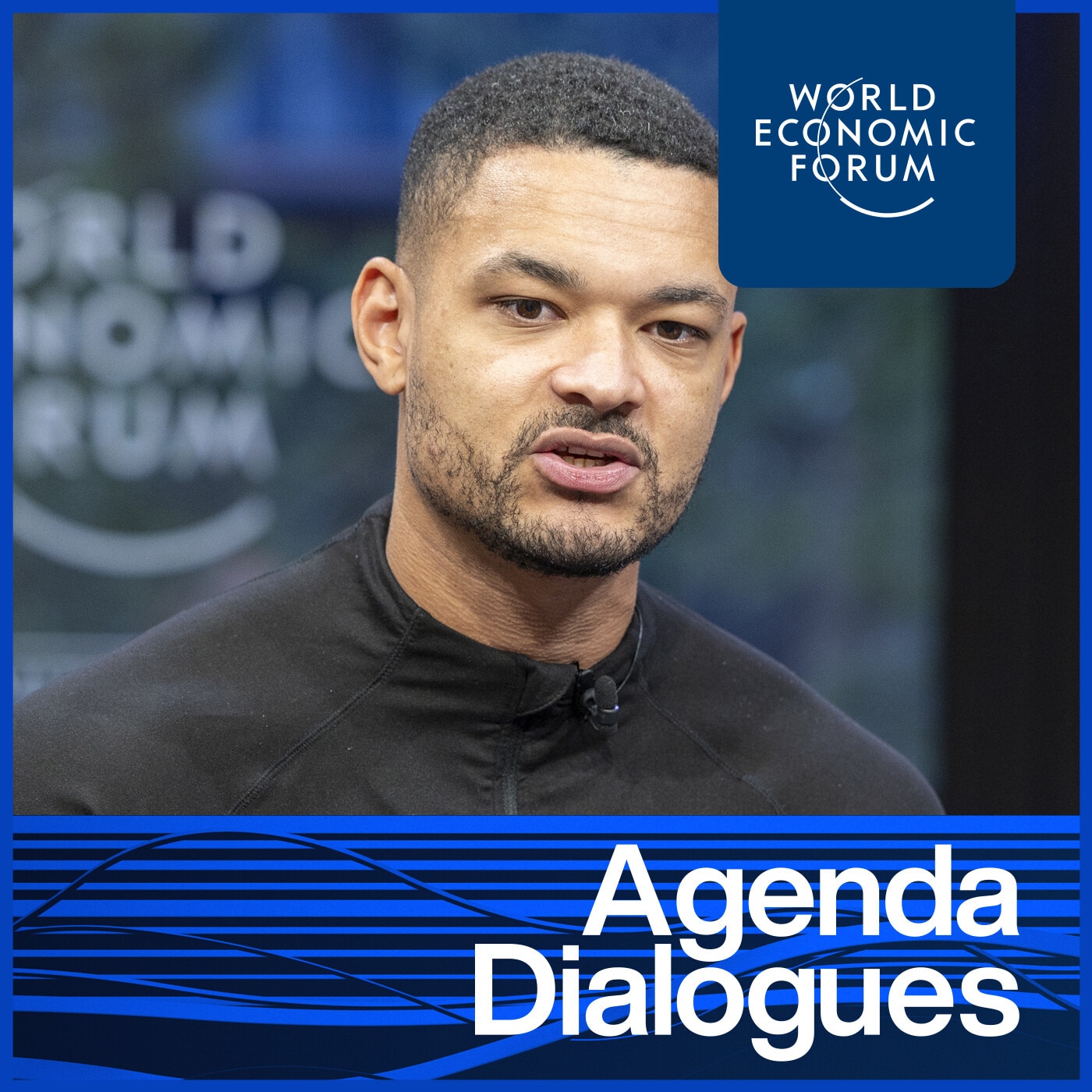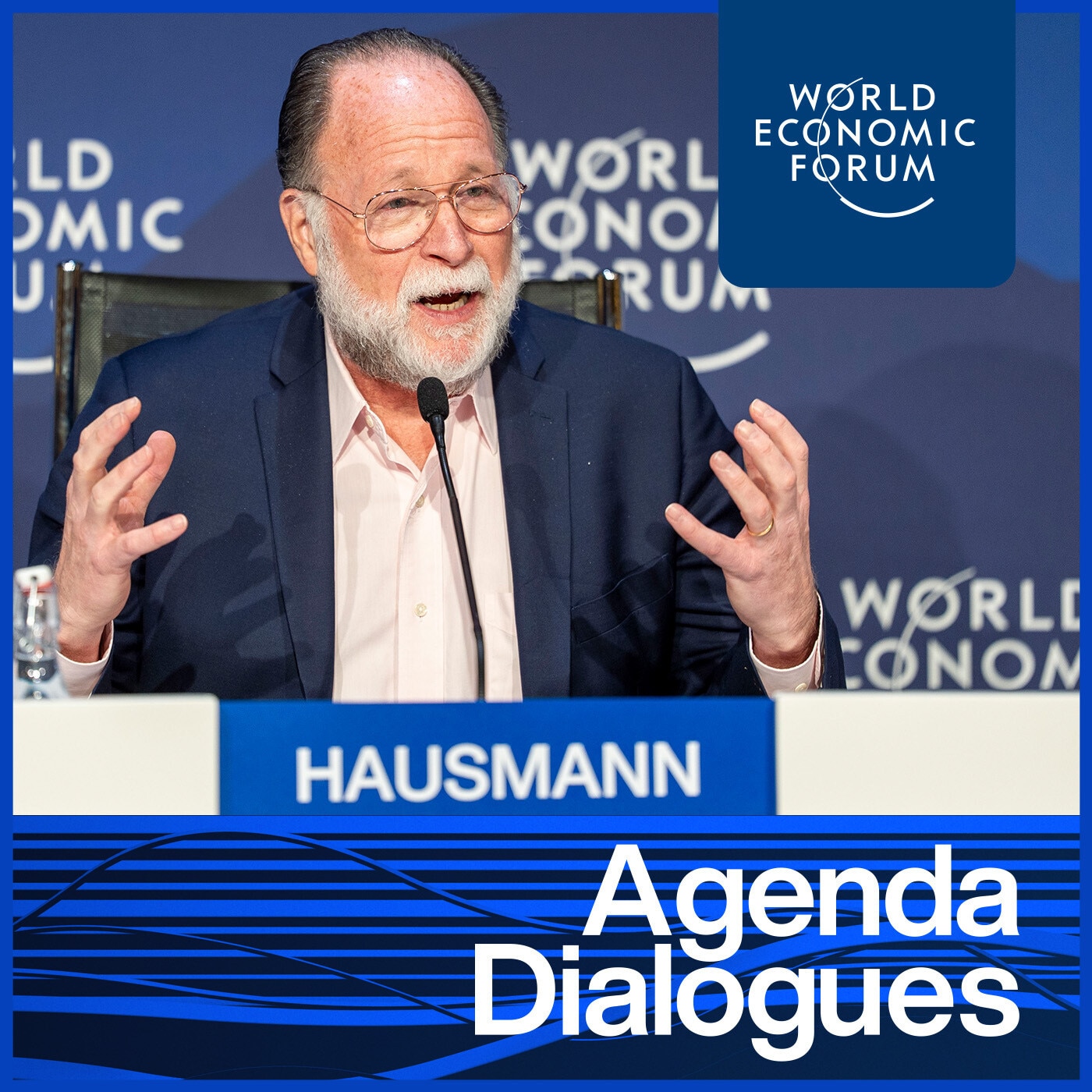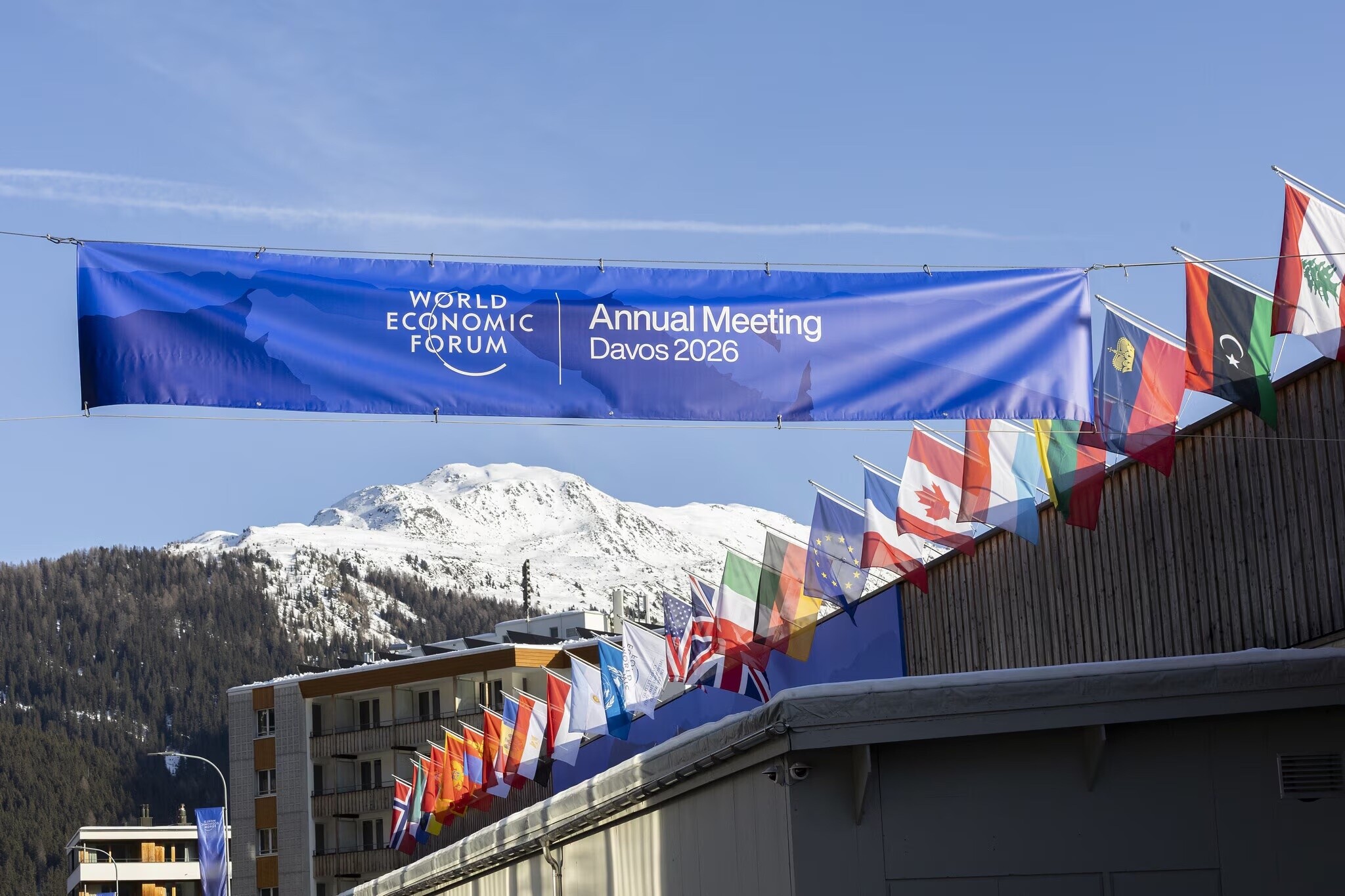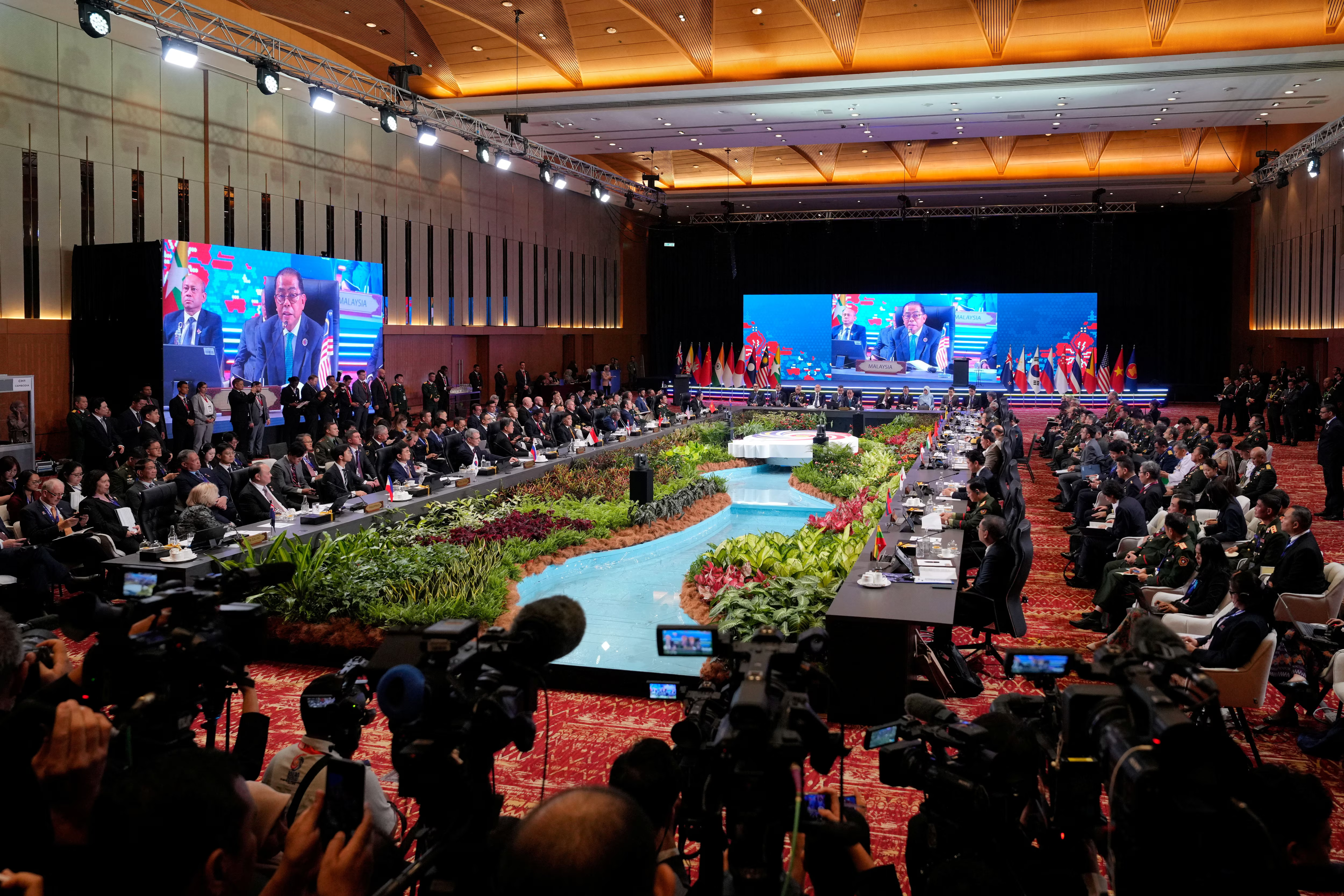First Impressions: Inauguration Day
Transcripción del podcast
Samir Saran, President, Observer Research Foundation (ORF)
Good afternoon and a very warm welcome to the first discussion at the World Economic Forum 2025. Let me also welcome those who are joining us on TopLink as this is being livestreamed. And let me remind everyone, if they want to tweet about this session, use #WEF25.
We are going to be discussing what is clearly one of the most significant developments of this decade. Over the last 20 years, we have the first Republican President who has won the popular vote. We also have one of the most stunning comeback stories, political comeback stories, in recent history. We also have promises of turning the world upside down and restoring sanity in some other aspects. And we also have a whole world eagerly awaiting the inauguration and what happens thereafter.
To discuss this, we have a fantastic panel of editors. To my left Mina Al-Oraibi, Editor-in-Chief of The National from the United Arab Emirates. To her right, Patrick Foulis, Foreign Editor of The Economist from the UK. And to my right is Sam Jacobs, Editor-in-Chief of Time Magazine. Sorry, I got the right and left wrong, but my hands were right. So, the good thing about being an Indian moderator is the hands talk, right? I was parachuted into the session to moderate this last minute because the UK was missing (it's a Brexit) and the largest democracy had to step in to deal with all this democracy. So that's the reason I'm moderating the session.
Without further ado, let me start with Mina, Trump 1, Trump 2 – sitting in the Middle East. What are you expecting? What are the expectations? What are the dynamics that you're anticipating? Some would say he's already had an impact. How is the region responding to this development?
Mina Al-Oraibi (Editor-in-Chief, The National) Thanks, Amir. Well, thankfully, we're meeting here in Davos with a ceasefire finally in place in Gaza and a terrible, devastating war of over 15 months. It's changed the region and in some ways it's changed the world. And Trump 2 actually facilitated the ceasefire. It's quite incredible that the deal that was finally agreed between Israel and Hamas and really brought in with the mediation and support of Qatar and Egypt.
But the changed factor was the US factor. This is the same deal that 13 months ago the Americans had said that they could pull off under a Joe Biden administration. But ultimately, it was the Trump factor. Trump clearly saying there had to be a ceasefire before inauguration. That moment crystallizes what people are expecting under a Trump administration. That comes with many lessons from its first stint at the White House, but also lessons learned of what can be possible in the Middle East.
Of course, there's been a major change also in Syria just a few weeks in now with a new administration in Syria and really a shift in where Iran stands in the region. So, looking at a Trump administration where Iran's strength through force, through brute force, often through militias and other nefarious means having a real influence on the region. During the Trump administration, there was a maximum pressure policy that started to try to tackle some of these issues, was really put on hold during a Joe Biden administration and now will come into force in a different light during a Trump administration.
The one change is some of the main participants in the first Trump administration, like H.R. McMaster and other generals that were known to the region previously, are not there this time. So, the military presence is less so in this Trump administration, and it's much more a business-focused administration, or people who are going to be involved in the Middle East, and I think that's something people are looking to see what that means.
Samir Saran, President, Observer Research Foundation (ORF)
Mina we’ll come back to you to understand how has the Middle East changed between Trump 1 and Trump 2? And who are the new actors there, other than the US, who are now going to exert themselves in what transpires in the future? I'm going to come back to you, and I'm also going to talk about the two-state solution, which now seems to be something that the majority of the countries in the world are endorsing quite loudly. And, how does that change? In many ways, the Trump dynamic that was set out in the first presidency.
But let me first turn to Patrick. You can also give a quick take on Trump 1 and Trump 2. How you think about the changes that you are likely to see and what has not changed, but also in what are the early indicators in terms of the key foreign policy priorities or economic policy thinking, and of course, domestic policy issues that America always is consumed with?
Patrick Foulis (Foreign Editor, The Economist)
So starting with the domestic scene and Trump, he's going into this inauguration in a very different way from the first inauguration. And you may have seen The Wall Street Journal's just leaked some details of the initial speech, instead of American carnage, we have a kind of optimistic can-do message for America. A much more convincing election victory for Trump than the previous result, which was contested. And there are strong signs that in some elements, the American public is quite strongly behind his agenda. For example, immigration and also the culture wars, gender and so on, where Trump's values are actually probably closer to the American average than President Biden. And that gives him, in some ways a strong domestic mandate.
In terms of the domestic priorities. Just to start off, I think what we're going to see is the method has changed to reflect that increased confidence. And let's be honest, that improved mandate. And we're going to see a flurry of executive orders that will instantly sort of test the capacity of American institutions on immigration, we could see stuff on TikTok, effectively overruling a congressional judicial decision. We could see states of emergency declared on various things, including trade. So, he's going to go for it fast and big in a confident way.
If I could turn to the foreign policy side of things. I think, again, it's a stunningly different picture for several reasons. One is that the world is colossally more dangerous than when he was first in office. We have two wars still going – I'm not as optimistic as you on the ceasefire. We have what I call the “three As” – Anarchy in some parts of the world (see Sudan), the axis of Autocracies cooperating more, and then in some cases, this new problem, Asymmetry (see the Houthis) sees whether American power is unable to cope with them.
And I think he's coming in at a time when American deterrence has collapsed around the world. People are simply not as intimidated by the superpower. So what will Trump do on foreign policy? Think American New York real estate tactics. When you're a company that's overburdened and strained, you do one of two things: you escalate or in US real estate terminology, you “kill the dogs”, you get rid of the weak obligations you have. And that framework, I think, will apply to how Trump views problems around the world.
Samir Saran, President, Observer Research Foundation (ORF)
In the 40s, the Atlantic Consensus. How is the EU-US relationship going to pan out?
Patrick Foulis (Foreign Editor, The Economist)
Well, it's one of the test cases, and it's obviously going to be really difficult. I see the Trumpian agenda essentially as a more comprehensive and forceful expression of American power on a much more limited geographic scope. So the more forceful expression of power includes things like renouncing international borders, which has happened in the last few days, and also the use of technology platforms to influence public opinion and other democracies, which is what we've seen with Musk and Co. over the last few weeks. So much more forceful use of American power, but at the same time retracting the geographic remit of America away from the idea it controls the whole world to a much more selective evaluation of its interests. Where is battleground number one for that set of issues? It's Europe. Ukraine, of course, is the catalytic event that will show American [Audio Cut Off Here]
Samir Saran, President, Observer Research Foundation (ORF)
I'm going to come back to Ukraine. I think that's an important question. And also, it's interesting to take a look at the list of leaders who are attending the inauguration and that's something to reflect on as well. So I'll come back to you on that, Patrick, Let me turn to Sam.
Sam, a quick take on Trump 1 and Trump 2, because it's only fair that you state your thinking on that. But I would also ask you to reflect on how do we actually assess what's happening in the US in this new presidency when it is certain that the media is not going to report as it is? The media is so biased, so polarized, it's actually impossible for us to understand what's happening in the US and we probably have to turn to Mina Al-Oraibi in the UAE to understand what's happening in American politics. How do you respond?
Sam Jacobs (Editor-in-Chief, TIME)
I recommend everyone turn to me now so I won't discourage that. First of all, Samir, thank you for stepping in and taking over this conversation. And thank you to the World Economic Forum for having us, but most of all, for having an exquisite sense of humour by asking us to say what's going to happen in the Trump administration. So, we are we are three hours away from the inauguration. Those who remember the first day of his presidency, he had one executive order. His team is telling reporters he will have 200 by the end of the day. So just on that scale, the Trump presidency could be a factor of 200 times more unpredictable, more volatile than the first term.
I think what I'll be watching for are where these points of tension arise. So, for instance, we've talked about his mandate. This is a Republican who won more votes from black Americans than anyone since Gerald Ford. He won more votes from Latino Americans than anyone since George W Bush as a Republican. Nine out of 10 counties voted more for Trump than they did the last time. And yet, while his popularity has grown and those of us in the US media told you that was impossible, that this man had a ceiling, he couldn't get more popular. And yet now we see he's about 50/50 when it comes to approval ratings. A lot of his ideas are not popular. And so that is a really important point of tension that Americans have gravitated towards this president.
But there are plenty of his ideas that not gravitated towards Americans in large majorities oppose the idea of removing birthright citizenship. That's something the President his team has discussed. You know, in large majorities they recognize that tariffs will increase the prices of goods. So that's good that Americans understand economics. And they also oppose the shrinking of the social safety net. And I don't quite understand how the President and his allies are going to approach this massive cut to government spending while also preserving the social safety net. Those things are intention.
And the other big point of tension, I think, for this president, President elect, he'll be a President in about three hours, is the fact that he ran on a pro-growth agenda and he has anti-growth policies. And so we have to see how these two things are going to play out – I think that's really important. And I should say to the question about the US media, I think an underappreciated factor here and I say this obviously with my own biases is how much President-Elect Trump still values the legacy media, even in a world of these rising platforms. Time, you know where I work and I'm proud to work, spent more time with the President than anyone else during this election year. He spent a lot of time talking to us as his team. He still cares very much, I think about two things: one, what the markets tell him; and two, how the legacy media is covering him. So even while we see these disruptive forces, even when we see this amazing growth of international media, I do think he will still be looking towards publications like Time, publications like The New York Timesand others to understand how he's doing and what's acceptable and what's not.
Samir Saran, President, Observer Research Foundation (ORF) So let me since you have raised this important point, let me ask you the question on X the former Twitter platform and the power of podcasts and Joe Rogan and others who today command millions of viewers. So how difficult from a media perspective is it engaging with as a leadership or a presidency like Trump? Are you guys resetting your organization to be in many ways more agile and more nimble to deal with someone like that.
Sam Jacobs (Editor-in-Chief, TIME)
Time had the opportunity to sit down with Joe Biden this year too which very few people did. But this is an administration that likes talking to the press. That believes in having conversations and exchanges. That is in fact operates in a very open way. So I would say, judging by their actions and not their words, are they spending time or are they giving briefings? Are they giving information? You know, obviously, the drama of the first presidency was a major focus for the press. But I think it's important while certainly there are legal issues and certainly there are threats against free speech in America, and certainly the President attacks the press, he also really loves the media. And I think that's an important thing to keep in mind.
Samir Saran, President, Observer Research Foundation (ORF) In fact, the Vice-President elect at that time was before the elections making a point to actually go to those big legacy media houses that were considered to be not necessarily favourable. Patrick do you want to come in on this?
Patrick Foulis (Foreign Editor, The Economist)
Yeah, I mean, I think there's two different questions you're asking, right? One is the extent to which the administration cooperates actively with the press and observes the norms. And the answer is it will to a degree. But, you know, based on the behaviour last time, I think it will be in some respects quite hostile. And we've already seen media owners of various flavours try to curry favour with the administration, which sends you quite a strong signal about what they expect to happen.
The other question is what extent the media gives an accurate guide to what's happening in America. And I think, again, we've had a pretty disappointing election campaign in that respect. You know, the polling system, which is often run by media companies, has proven, again, to be really quite inaccurate. And the base assumption was that Biden was fit enough to be elected. That turned out to be wrong. And I think that's a huge failing on the part of the media, really, the establishment media. And then also that it's then bigged-up Kamala Harris, which proved to be a bad decision and then again, didn't really anticipate Trump. So I think the legacy media has a big problem, and it's coming at a time when the disruption of the business model rumbles on for the big media houses.
Does that mean I'm pessimistic about free speech and truth in America? Not really, because it's the largest, most vibrant, most riotous arena for speech and ideas in the world, too. And I think it's possible from that to kind of have a kernel of truth that still comes out. The one game changer, I do think, is the marriage of Musk and Trump, or at least maybe marriage is the wrong word, or maybe there'll be a divorce within a few weeks. But I think that is very important. And Zuckerberg's decision effectively to suspend these constraints and possibly the banning of TikTok or some kind of deal, perhaps that creates an entity that's beholden to Trump in some way. And I think they will be using that media platform much, much more aggressively to try and influence public opinion in the US. But as I mentioned before, also overseas and obviously places which don't have free media, China, Iran, Russia, for example, are largely immune from this. So paradoxically, it's actually the allies and democracies where there’s Trumpian distortion.
Samir Saran, President, Observer Research Foundation (ORF) If you were in Berlin, you would complain about something like this, for example?
Patrick Foulis (Foreign Editor, The Economist)
In fact, Chancellor Scholz already has.
Samir Saran, President, Observer Research Foundation (ORF) Correct. Mina.
Mina Al-Oraibi (Editor-in-Chief, The National
But I would say it's also happening at a time when deepfakes have become much cheaper to produce and are proliferating. So actually, you know, independent of how the Trump administration is dealing with the media, there's going to be increased confusion and the speed of fake news traveling, whether they feed into that or not is really a challenge. And challenging media globally, not just, of course, the US. So it could in some ways actually help the legacy media where people will come back to them to verify the Trump actually say this would happen.
It's incredible to see how Donald Trump has used direct access to audiences by using his own platform. Or of course, now with Musk and Twitter. But there will still be messaging. I think we found that actually with the Trump administration, they do want to talk to the media and they do go to the legacy media actually much more than we found that the Biden administration.
Samir Saran, President, Observer Research Foundation (ORF) But the role of the editor is perhaps even more pronounced today because they had to make sense of all the noise that is available.
Patrick Foulis (Foreign Editor, The Economist)
A panel of editors decides the answer.
Mina Al-Oraibi (Editor-in-Chief, The National
That's right.
Samir Saran, President, Observer Research Foundation (ORF) Look, I think it will be fair to discuss three international issues since this is a global conference we’re sitting at. And let's start with the most obvious one, ceasefire in the Middle East. And Mina I’ll start with you, and I want both of your takes on how do you see this panning out considering that Trump is not going to necessarily enjoy the same ability to move the capital to Jerusalem and forget about a geographical entity called Palestine? It is now real as part of any deal. And how does he navigate that?
Mina Al-Oraibi (Editor-in-Chief, The National
So the fact that 75% of the member states of the U.N. today recognize the existence of a Palestinian state is, of course, a game changer compared to where we were previously. I think also in the Middle East, officials throughout the Middle East realize that this is an issue that really does need some sort of solution. And again, the fact that the ceasefire was put in place just before the inauguration of Donald Trump shows that they realize this is not something that they want hanging over their heads from day one. But it is a long road ahead. And to your point about being optimistic or pessimistic, absolutely. There's still so much that can go wrong. There's a ceasefire in Lebanon. There's a ceasefire that at any point that can go. We still have, of course, a terrible situation in Yemen and much more to go.
But I think for the Trump administration, there is a sense of how powerful actually America can be when it chooses to use that power. And the one thing that is clear is the US remains the most important superpower. They've shown that in the Middle East, American economy has knock on effects globally, but again with the Middle East. So I think actually geographically and the geographic reach of the US is much greater with the difference that now of course the Afghanistan question is closed. And even though it was Donald Trump who said we need to withdraw, the shambolic withdrawal that happened from Afghanistan is really on the shoulders of the Biden administration, even if they try to shift blame. So I think that puts them in a position where they realize that they can move the needle, that there is interest in this in the Middle East region, but also in Europe. And the fact that you have now a coalition between Norway and Saudi Arabia and others, European and Arab countries trying to drive a two-state solution that in some way can help the US not have to deal with the details and the nitty-gritty, but actually own a deal and be able to say we're able to drive this deal.
So it's an important moment. And again, the dynamics with Iran, this can't be seen as separate from Iran with what's happening in Syria and Lebanon and the fact that you actually in the grip of Hezbollah and in the grip of Iran in both Syria and Lebanon is something that Trump will want to champion. Let's not forget that his daughter’s father in law, is an important Lebanese player now in this, and he can actually influence some of the dynamics. And again, I think that shows still the US has incredible power over some of these things.
Sam Jacobs (Editor-in-Chief, TIME)
I want to just jump in here. What's interesting, we asked President Trump just the week of Thanksgiving, when we went down to visit him about how he thinks about Ukraine, how he thinks about the ceasefire. And as perhaps you could expect, there is a level of confidence when it comes to the Middle East. He said no, that's very easy. It's very easy. Ukraine's a little harder, but the Middle East is very easy. And so there is a kind of sense of comfort and confidence that may be completely misplaced, but there is a real sense of, well, we can take care of that problem.
And it was interesting, over the course of a few weeks, there were developments that seemed to come in the administration's favour, at least the developments that they were supporting. And, of course, he has promised that he'll solve the Ukraine-Russia war tomorrow. So I think the new we talk about the Trump effect, there are limits to it. And so we can see in places where it has proved effective, or at least where the administration believe it's proving effective. And then there are other places where.
Samir Saran, President, Observer Research Foundation (ORF) If you were to be sitting in Europe today and certainly if you were to be.
Sam Jacobs (Editor-in-Chief, TIME)
I think we are.
Samir Saran, President, Observer Research Foundation (ORF) That's right. Okay.
Sam Jacobs (Editor-in-Chief, TIME)
Thank you. And just thank you for having me.
Mina Al-Oraibi (Editor-in-Chief, The National
We're in planet Davos, we’re not in Europe.
Samir Saran, President, Observer Research Foundation (ORF) I'm so in Europe today and certainly in central Eastern Europe. Yes, there is a realization that you are looking at a bad deal.
Sam Jacobs (Editor-in-Chief, TIME)
I think what's interesting, one of our reporters who's great on Ukraine, Simon Shuster, talked to someone close to Zelenskyy at the end of the Biden administration and said, you know, how do you assess the Biden administration's legacy when it comes to Ukraine? And the answer was, we don't know, history will tell.
Now, America spent $183 billion on Ukraine. I do not anticipate that President Trump is going to spend the same amount supporting Ukraine. And so the fact that there's a sense of suspicion and discomfort with how the Biden administration handled Ukraine really makes me concerned about what, you know, America's place is going to be in that conflict going forward.
Patrick Foulis (Foreign Editor, The Economist)
First of all, on the Middle East, I mean, I think there's no doubt that Trump has made things better. As you've said, he seems to have been instrumental in getting the ceasefire. That doesn't mean one should be optimistic. And the reason is that what's been agreed, the first stage of the ceasefire, as you know, really doesn't answer any of the major questions. And it doesn't answer the question of is it acceptable to Western powers or even the Gulf states to have Hamas still in control of Gaza? And that's the signal they're trying to send in the last few days that they are in control. It doesn't settle the crucial question for Israel of whether it retains the right to intervene militarily in Gaza under certain circumstances. And, of course, it doesn't really address the fundamental and possibly irreconcilable set of views of both sides around a two-state solution. And bear in mind, at the moment, we have a government in Israel for now that is implacably opposed to that.
So, you know, the Trumpian vision of essentially some kind of cessation of violence between the Israelis and Palestinians, an alliance between Israel, America and Saudi, and then using that to kind of impose conditions or intimidate or reduce the power of Iran is a compelling vision for the Middle East. It's just that I don't think we've really made a giant step towards it.
On Ukraine know the picture I think is Russia continuing to cause enormous attritional damage to Ukraine both in terms of sort of incremental terrain gains and casualties and imposing acute strains on Ukraine's political system, including the legitimacy of Zelensky. And obviously, we all hope that President Trump does manage to negotiate some kind of deal that's on favourable terms to Ukraine. It's hard to see the leverage he has over Russia. You know, I think possibly the only thing the US could do is try and impose much more draconian oil sanctions on Russia. But because of Trump's interest in the stock market and the economy and inflation and so on, that may be something they're reluctant to. They could consider inducements for President Putin, release them from sanctions, give the foreign exchange reserves money back and so on. But that would point more towards I would say, a short term deal that gets some kind of ceasefire and fighting to stop but doesn't really solve the fundamental problems in the long run. And aren't those two situations really rather similar?
Samir Saran, President, Observer Research Foundation (ORF) I think you raise an important point. And we come back to the economy. I want to speak about the energy business, the climate agenda, and of course, because that's a big topic at the Forum in Davos each year. And you know, what happens in the IRA? What happens to the big plans and certainly from a Middle East perspective as well. You know, we've hosted COP28 and there was a big announcement around the green transition. What happens with that? But before we come to that, let's talk China. That's the third international issue I really wanted to pose to all of you. But the US-China relationship and we hear all sorts of news, right, making a trip to China, inviting Xi Jinping to the inauguration. What's happening here?
Patrick Foulis (Foreign Editor, The Economist)
Well, I think is this is the one area where I think if you look at the Biden administration, the record is actually quite good from an American interest point of view. They've rebuilt a system of alliances in Asia and renewed it. They've imposed a number of controls on China's economy, which seems to be doing serious damage to it and have got in a position, I think, where America appears to be the ascendant power and China is stagnating. And if you go back to where we were five or 10 years ago, that's a pretty massive change.
So, Trump in one sense represents continuity. And in some sense, he's actually the intellectual author of the Biden policy. But I think we have very, very solid grounds to doubt his ability to apply over a sustained period of time that kind of strategy. One, because he likes deals on tariffs that may lead him to make concessions on other things – so the transactional element of Trump has risks. And two, because of his unease with alliances, which in the Pacific are the absolutely crucial element of American deterrence.
Samir Saran, President, Observer Research Foundation (ORF) And then I'm going to come to you on the same question.
Sam Jacobs, Time Magazine I believe, you know, John Bolton wrote that when the President was President and discussed whether he would protect Taiwan, he said no. I mean, I think his record there is clear and I assume the Chinese have read that. And so I think what's going to happen there is it is, like we've said, quite, quite unpredictable and quite risky.
Samir Saran, Observer Research Foundation And as Patrick mentioned, there's been now continuity over a decade, perhaps, if not longer – I think it continues from Obama's second term right to Biden White House now – that there has been increasing American pressure on trying to prevent China from sending both the technology power but also the geopolitical power. Right? Is that going to change?
Sam Jacobs, Time Magazine Who is he listening to? Is he listening to the Elon Musk of the world who have significant business interests in China. You know, is he listening to a more hawkish voice in a Marco Rubio? I think the question is which of those voices is going to carry through? And I think.
Samir Saran, Observer Research Foundation On a particular day.
Sam Jacobs, Time Magazine Well, and who speaks last? I mean, it is he is constantly evolving. And I think that that that is something to keep in mind, that it's very hard for any of us to sit here and say, here's what the US-China plan is going to look like five years from now.
Mina Al-Oraibi, The National The economy will be an important part of how Trump looks at China. I think he's less ideological when it comes to certain issues like Taiwan and others that have really dictated sometimes China policy. Marco Rubio is very interesting as secretary of state, and I think there will see some influence. But I do think it will be driven by economic considerations when it comes, again, EVs from China. This was an issue that, you know, under the Biden administration was pushed out. And there are lots of American companies are saying, hold on. What are we actually doing here? What does it look like?
So I think it will be economically driven. I don't think there's a solid China policy for Trump. So that's one of the unpredictable elements that people are looking towards and are not sure whether it will actually end up staying with. But I think also China today is looking different from where we were five or six years ago. And so what they're going to be interested in? But I think the technology race is one that is going to be instrumental in that economic conversation.
Samir Saran, Observer Research Foundation And since we you Mina, why don't we speak about the energy transition agenda, the green transition agenda? How is that going to, in your assessment, pan out under Trump? Is that over? Should we not pack up the green bags?
Mina Al-Oraibi, The National I think the reality is everybody sees climate change tangibly. And we see it here gathered here. You know, the levels of snow compared to what we're used to. In the Middle East, we absolutely feel the impact of climate change. So I think for countries, be it the US or others who have said, okay, we're serious about this, we need to think about energy transition, they're very much there. I don't think is going to be a major reversal. However, will the speed change? Absolutely. What will Trump's approach be when Brazil is hosting COP30 will be really important. And I think actually think the reality is that the energy transition is necessary, but it may get slowed if America gives completely different incentives to actually let's be thinking about oil. The reality is, though, they have been pragmatic when it comes to some of these issues beyond the bombastic announcement. So we might get something, you know.
Samir Saran, Observer Research Foundation So there would be some semblance of continuity even in the green transitions. Patrick?
Patrick Foulis, The Economist Yeah, I think one of the best guides to Trumponomics is to look at the markets over the last few months and it gives quite sophisticated signal about what might happen. So huge surge in small business confidence in America reflecting the empty red tape sentiment, inflation expectations and growth expectations have risen. And you know that's the American animal spirits back in action.
On the negative side, more cronyism favoured businesses, including Elon Musk. But some of the crypto players and others share price is surging, suggesting a kind of oligarchic capitalism. Shares of vaccine makers underperforming, showing the kind of strand of anti-science that's there in the Trump agenda. And of course, inflation is a double-edged sword because the market has some alarm about that. And lastly, on the energy side, you know, the oil price has gone up a bit, partly because of concerns over Iran, but renewable energy, stock prices have collapsed because people assume that the favourable environment has changed.
I mean, I think just on the economy, there are a couple of interesting risks to consider. One is inflation. If it if expectations rise much more, that's going to start causing a problem for Trump. Two is the fiscal situation in the US, 6% budget deficit. Apparently no one cares, but that's going to come back to bite America at some point. And then lastly, I think for Trump, this strange marriage, which you were talking about, both the oligarchs and the working American, is it really capable of delivering an economic policy that benefits ordinary Americans who are feeling pretty frustrated about inflation and so on? And those are big question marks that will be answered.
Sam Jacobs, Time Magazine I would just add, there are a lot of Cybertruck's parked outside Mar-a-Lago right now. And my point is, if for Trump, that energy transition can be reframed as a nationalist cause or something that benefits the American economy, I don't think he's going to oppose it.
Samir Saran, Observer Research Foundation And what is your what is your take on the nexus of these big houses, big business houses and the blue collar and now increasingly voting Trump? How does this relationship pan out?
Sam Jacobs, Time Magazine It's not new for the Republican Party.
Samir Saran, Observer Research Foundation Or Democratic Party in some ways, some years.
Sam Jacobs, Time Magazine You know, what's the matter with Kansas? I mean, this is sort of been talking about in different moments of the Republican Party for many years as well. We've seen the debate play out over visas already. And Trump stood strongly with the voices that that were pro bringing in a certain type of immigration. And so I do think there are going to be these moments of tension. And I think we'll see how this plays out. When you see someone like J.D. Vance as someone who's trying to synthesize these two different these two different sets of interests in the Republican Party. And I think important to note what's different about Trump 2.0 versus Trump 1.0. Very soon, he's a lame duck. And people like J.D. Vance are people who are going to emerge and try to figure out how are they going to carry forward his vision. Trump didn't have to worry about that at all the first time.
Samir Saran, Observer Research Foundation I mean, there's a whole discussion there. And J.D. Vance, and it's his role and future in this discussion.
Mina Al-Oraibi, The National And there’s also the midterms coming up in the House of Representatives.
Samir Saran, Observer Research Foundation Right. Let me turn to all of you. If someone wants to come in, we have mics here and we can come to you. Please raise your hands, get our attention, and we'll turn the mic to you to pose some questions .
Patrick Foulis, The Economist Think there might be one behind you.
Samir Saran, Observer Research Foundation
There's one behind me. There's one here. Everyone is behind me. This is not fair. But anyways, go ahead. So we have a couple of questions here and another one on the side.
Question 1 from audience: Hello, I’m from Swiss public television. Thank you for the speech was really interesting. My question is very basic. The role from the Trump's perspective. What is the role of Europe? I mean, everyone knows it was a time when United States didn't know the phone number for Europe. And recently they said the phone number for Europe is the Prime Minister in Italy. And the Prime Minister of Italy is in Washington right now. And the commission is not very happy about that. So in the perspective of the United States, what in it's mind, I mean, Europe. Is it what for the United States? And what's the destiny?
Samir Saran, Observer Research Foundation Can you share the mic? Go ahead.
Question 2 From Audience And what is the reality for Africa? What does in the Trump lucky packet it for Africa?
Samir Saran, Observer Research Foundation And then the third hand somewhere, can we bring the mic to them? Let's take these three questions. Let's bunch of them and come to you.
Question 3 From Audience Well, thank you so much for this. My question has to do with Latin America. So you mentioned that the US is withdrawing and getting more selective on the regions, and they also mentioned their maximum pressure and strategy. So I'm wondering many both talk about a return of the Monroe Doctrine in a way. And we're seeing, you know, Marco Rubio.and well all this talk of Canada and the Panama Canal. Well so for example Edmundo González from Venezuela was invited to the Trump inauguration. So I'm wondering, do you see the Trump administration bringing back American focus to South America and Central America, which is an area that has been away from the US main interest since at least the first Bush government since the Free Trade Agreement of the Americas failed?
Samir Saran, Observer Research Foundation Great. So we have three. We have three.
Sam Jacobs, Time Magazine You're going to add a fourth to this? Okay
Samir Saran, Observer Can we go by note and then we'll quickly go?
Sam Jacobs, Time Magazine Sure.
Question 4 From Audience Mine is very, very related. What's the role of the United States in relation or what's the attitude towards China taking much advantage of this vacancy that the US has an experience in Latin America many would like.
Samir Saran, Observer Research Foundation Yeah, that's going to be final.
Question 5 From Audience So my question is also about the China-US relations. Under Trump it has become increasingly decoupling from China, including the ban on TikTok and also the tariffs. And what do you think are the factors behind this phenomenon and how will the tariffs impact the China-US relations? Thank you.
Samir Saran, Observer Research Foundation OK, so we have we have five questions. We have eight minutes. We have three speakers. That's the question.
Patrick Foulis, The Economist Can you solve that equation?
Samir Saran, Observer Research Foundation And you have to give me 30 seconds to thank you in the end. So two minutes each. And you can pick and choose what you want to respond to. And if I think that an important element has been left out, I'll come to you. Go ahead.
Patrick Foulis, The Economist
Well, why don’t I do tariffs on China. So Europe. Problem A, is Europe hasn't really got its act together. It's had a long time to do it. The defence situation is still kind of risible, really in terms of the level of mobilization and coordination to take America's place if that's required. So that's one thing. Europe is coming from a position of weakness, which is always bad with Trump.
The other thing is we have, notwithstanding your point about Meloni, you know, we have the two core engines of Europe, France and Germany, in very difficult political situations which will rumble on, even after the German election if coalition is built for some for some time. I think that makes Europe the vulnerable party here and that's a bad place to be.
On tariffs for China, I think it's priced in already. And you can see the foreign exchange markets have been moving over the last month or two to basically kind of signal that the market's adjusting to a 10% or 20% tariff. Is it helpful? It's really not helpful at all for China. And it makes things even worse. And China's ability to restart its economy is one of the central conundrums that will happen over the next few years.
Sam Jacobs, Time Magazine So I would take this question and just pull back from it a little bit, which is to say the core of the strength of Trump's rise also sits inside of the weakness. Right? So we have these movements for populism. We have a rising China still, despite whatever the kind of concerns are. We have these issues around global migration. We have these issues around climate change. All of that is driving a fury which is driving Trump to office. And now in three hours, they're all his problem. And so all of these concerns about what's going to happen all over the world is no longer something that creates frustration and anger in the American voter, which leads to the election of Trump. It's now something he has to deal with. And so he is both the beneficiary. And now he's going to have to manage all these different questions. And I don't think for very long it's he's going to be able to say, you know, this is the Biden-Harris administration's problem.
Samir Saran, Observer Research Foundation And what about the question on the Monroe Doctrine and the Panama Canal and Greenland and Canada?
Sam Jacobs, Time Magazine His fascination with Greenland is nearly a decade old. In fact, it's an American fascination. This was discussed in 1947. We thought, well, maybe let's Greenland looks interesting. The guy loves real estate. You know, he loves it. You can't deny it – Canada would be nice, you know, and maybe the canal and I mean he thinks in that way. And I think he sees the world in a transactional way. And I think that we're all laughing about Greenland. And again, we shouldn't be in the predictions business. We're terrible at it. But I think it's a real possibility. I don't think it's completely insane. I think something could happen.
Samir Saran, Observer Research Foundation Look, just so that we could design this panel to set the three of you up for failure.
Sam Jacobs, TIme Magazine I appreciate that.
Samir Saran, Observer Research Foundation You know, three hours before the inauguration, you three are now deciding the next four years of the presidency. Best of luck.
But no one has yet spoken about – I think that's an important question – Latin America. And the last three or four years under Biden, it was quite clear and maybe preceded Biden, but it was quite clear that China was the most important partner to most Latin American countries. Is it going to change under Trump? And I think that's the point someone was asking, Are we going to see America more engaged with Latin America as a serious geography of strategic importance?
Sam Jacobs, Time Magazine I can't say. I mean, we truly don't know. I don't think there's a consistent view from the administration today about how to approach these problems.
Mina Al-Oraibi, The National I think the Argentinean role will be important. Clearly, there's a personal relationship there. And Trump, you know, thrives on strong personal relationships. And he just thinks, okay, this person can actually help develop that particular region or so forth. But I do think, you know, like Sam, I'm just thinking about the bigger picture, which is international law is incredibly weakened security architecture, Ukraine being a big part of that. But there is no real clarity on European security architecture. Security architecture in the Middle East is up in the air at the moment.
And for Africa, security is a major issue. And the US has basically said we're not interested, and the French have pulled out. So there's a global moment here where Trump is coming and the unpredictability that Trump represents- it's also unpredictability of the world. And so, yes, I think it's a very serious moment and international norms are broken. Nobody can blame Trump for that. I think there are many other dynamics, but the US has played an instrumental role in breaking some of these norms. And as you know, I always will mention Iraq. And I think the Iraq war of 2003 feels like a long time ago. But there's things that have happened in the last two decades where it really does feel like there's a moment for a stronger international order and perhaps one that is more transactional and that is based on, okay, these are national interests and that's what we're going to go after. And we've seen that's what voters want. And the moment in France and the moment in Germany now is what does that look like in Europe? But also in Africa, you have African nations saying, okay, well, where are our interests? Because we clearly can't rely on old, you know, partnerships and relationships, be it in Europe. And that's why you see in China, but also in the UAE and Saudi Arabia and other countries around the world, having roles in Africa that you couldn't have imagined 30 or 40 years ago. So it is a moment of change and unpredictability. And it's not clear what the Trump doctrine will look like. But I think everyone feels like there is a moment for change that's needed.
Samir Saran, Observer Research Foundation So a quick question to both of you. Biden’s administration at the very end saw the importance of investing in connectivity and infrastructure. There was the arrangement, but there was also an external investment agency created to fund projects in Africa in other parts of the world, to become development actors, to prevent, you know, losing space in many of these countries. In your opinion, are we going to see America present in those sectors, connectivity, infrastructure, global development sectors? Or are we going to see the real estate baron back?
Mina Al-Oraibi, The National I think so.
Patrick Foulis, The Economist Go ahead.
Mina Al-Oraibi, The National America would do well to be involved in those infrastructure projects and think about connectivity. And they think, again, the world is changing. So infrastructure, real estate, Yes. But actually, you need everything that's around that that's going to make sense. However, are there the right people who can actually implement that and see it through in the long term? That's unclear for this administration.
Patrick Foulis, The Economist So I think within the US, Trump will repackage all of the Biden industrial policy and it's going to carry on because it is very much up his street and is about physical assets, which is something Trump places great weight on. America will try and exert more influence over the world economy, but it will not do it through inducement, including the kind of things you were just describing. It will do it through threats and use of.
Samir Saran, Observer Research Foundation Debt.
Patrick Foulis, The Economist Coercion from technology controls to, of course, tariffs and the desire to influence the world economy is there to a degree. But the tools will be very different from the post-1945 order.
Sam Jacobs, Observer Research Foundation This is a moment when everyone is looking inward. And so it's an interesting time to have a conversation about what an American leadership looks like at a moment in time when the President to be surrounded by a team that says that's not our problem. And I think it creates to your point, Mina, they're creating unpredictability through their actions. And they also are rising to power because of that unpredictability.
Samir Saran, Observer Research Foundation Great. I think this is a fantastic conversation to kick off Davos 2025. And I think it's an excellent segueway to the inauguration that will happen this evening. Thank you. Please thank the wonderful editors for joining us this afternoon.
As the first Republican Party candidate to win the United States popular vote in 20 years, Donald J. Trump will be inaugurated as president at noon on 20 January 2025. This special session -- the first of the 2025 Annual Meeting in Davos -- will gather media leaders to explore how the new administration will operate.
Alojado por:
Temas:
Geo-economía y PolíticaMás episodios:
La Agenda Semanal
Una actualización semanal de los temas más importantes de la agenda global
Más sobre Geo-economía y PolíticaVer todo
Ariel Kastner, Miriam Schive and Sofia Balestrin
11 de febrero de 2026
